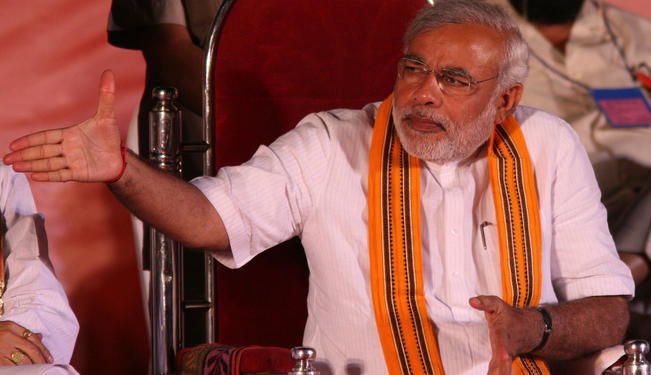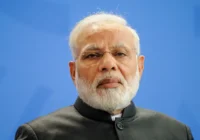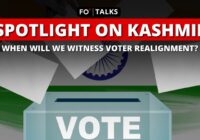Narendra Modi has raised the level of political discourse in India.
It ought to be clear by now that neither the Indian National Congress nor the country's media have any interest in critiquing Narendra Modi, chief minister of Gujarat and a potential prime ministerial candidate for the Bharatiya Janata Party (BJP). The regularly manufactured public outrage over a trivial comment about puppies — not to mention his choice of headdress or the color of his kurtas, loosely fitted Indian shirts — is indicative that with the intellectual depths Modi's foes are trolling, it promises to make the election one for the ages. Ironically, it is therefore left to someone more sympathetic to Modi to grill the man that India's middle class seems to want at 7 Race Course Road next year.
It should be noted that officially, the BJP has not declared Modi as their candidate. Modi himself has taken an innovative approach by playing the heir-apparent-in-waiting, so to speak, with his country-wide rallies coupled with his silence on his personal ambitions for 2014. Nonetheless, in the wake of what can only be called his pre-campaign speeches and given the likelihood of his becoming the BJP nominee, it is only right that that we seek answers from him on matters of national importance, forcing him to separate rhetoric from policy.
On the Spot
First, and very importantly in India's present geopolitical environment, what are Modi's thoughts on foreign policy? The BJP claims to be the party with a difference, but as Rajnath Singh said recently, there is little it intends to change in the Congress' steering of the ship of state. Does Modi agree with his party's president, or does he stick to his own view that, for example, Pakistan ought to be responded to in the same way it behaves with India?
A few months ago, in the TV show Aap Ki Adalat, Modi was vague about what that meant. The answer, though, is of great importance to India, not least because of Pakistan's nuclear weapons and its infestation with terrorists. It is easy, sitting in opposition, to mock the Congress-supported Aman ki Asha and advise that Delhi "stop writing love letters" to Islamabad, but what can Indians expect from a Modi-occupied Panchavati (prime minister's residence)?
India's foreign policy extends beyond its aggravating neighbour in the west. What are the Modi's thoughts on India's porous border with Bangladesh and the influx of thousands of illegal immigrants? Where does Modi stand on the Tamil imbroglio in Sri Lanka? Is the fondness between Jayalalitha, Tamil Nadu’s chief minister, and Modi to be taken as his adoption of her views on the matter? Will those form Delhi's official response to the island republic? How does Modi wish to improve relations with India's other neighbors: Nepal, Bhutan, and the Maldives? The arrogance of India's foreign service bureaucrats has destroyed any warm welcome Indians once had in those states.
Critically, where does Modi stand on India's relations with the superpowers: Russia, China, and the United States? Cables from Wikileaks indicate that the United States thought Modi's ascendancy would put an anti-American prime minister in power, and Russia has been worried of India's recent drift towards the West in terms of military and commercial trade. China represents not only a worrying trade imbalance, but also a security risk on the border as well as in the cyber domain. What is Modi's proposed course through these treacherous shoals? Furthermore, can Tokyo expect its relations with Gandhinagar to be promoted to the national level? How will Modi play India's cards in the increasingly important Indian Ocean Region?
What little Modi has uttered on India's external affairs makes no sense to anyone classically trained in international relations. His suggestion that each state have their own representatives to countries they trade with devolves foreign trade relations to states, something that has not worked in the past (remember the US Articles of Confederation?). His belief that India can do without organizations such as the United Nations is questionable; for example, Indian troops in blue helmets can be effective ambassadors of the country too. The forum, if not a positive force, at least acts as a venue for damage control regarding thorny issues such as Kashmir, environmental guidelines, global Internet laws, nuclear policy, terrorism, and R2P interventions. The man from Gujarat seems to limit his view of the Ministry of External Affairs to "trade and Pakistan," a worrying attitude to have as India strengthens ties with countries as far-flung as Australia, Japan, Israel, and the United States.
Second, on security: Modi has certainly ticked off all the boxes on a politician's check-list of terms to spout, such as "zero tolerance." However, this silver bullet does not seem to have solved the problem anywhere in the world. On other issues, like defence production indigenization, Modi has expressed support. Yet that is the same rhetoric we have heard from the Congress for decades; few politicians argue that India must import all its weapons systems, so what exactly does Modi intend to do differently? Then there was, of course, what can only be described as a foot-in-mouth moment at the India Today Conclave, where the Gujarat chief minister proposed that the Border Security Force install solar panels along the border with Pakistan.
Modi, your panels will not stop Pakistani tanks, and nor should the military be deployed for civilian tasks. In addition, an ocean of panels obstructing clear vision of the border might, in fact, aid infiltrators in avoiding detection.
Third, the BJP's likely prime ministerial candidate has also spoken about increased federalism. Like any idea, it has its strengths and weaknesses. For those paying attention to Indian politics, would Modi please clarify what his vision of the idea looks like? India's states already have trouble seeing eye to eye on a variety of issues — water sharing being among the more prominent. In this climate, particularly with linguistically based identities, are strong states and a weak center not a cause for concern?
Fourth, Modi has made good governance the foundation of his political message, and it seems that he delivered on this promise. However, not everyone in the BJP is Narendra Modi, and it remains to be seen how he will act on corruption within his own ranks. Though the Congress Party has drilled to new depths in its corruption, the BJP is no paragon of virtue either, and coming to power only increases opportunities for a little side income. Furthermore, how would Modi deal with corruption among alliance partners whose support would be crucial, especially since the BJP is not expected to secure anywhere close to 272 seats next year?
Fifth, where does Modi draw the line between minority protection and minority pandering. It is undeniable that Congress has been opportunistically pandering to minorities, and this has earned the ire of many not even in the BJP too. Modi has been clear in his actions, if not words, that his regime will not continue this partial treatment, and his opposition to educational scholarships and religious minorities is ample proof of that.
The issue becomes much murkier when it comes to noise pollution by religious buildings, evangelicalism, and personal law. Matters become even more complex when one considers the deep schisms within Islam, for example, and the different interpretations of shari'a. In addition, not all markers of religious identity are problematic in a liberal, multi-cultural democracy — while marital jurisprudence and certain aspects of the dress code according to shari'a comes under frequent attack, hygiene, ritual obligations, and dietary laws ought not be of concern to outsiders.
Any genuinely neutral humanist would agree that Islamic personal law needs to be rescued from orthodoxy, but what mechanism does Modi have to bring all parties to the table in good faith? Would he dare push for the constitutionally mandated adoption of a Universal Civil Code?
Sixth, the BJP has visibly protested several of Congress' policies — some on administrative differences and others on ideological grounds. The question is, if they have power, what policies will they actually reverse? Will it have the parliamentary mandate? Will it succumb to political pressure and co-opt the questionable legislation? Does it dare touch Article 370? Section 66A? 498A? The Food Security Bill or National Rural Employment Guarantee Act? Will it make Hindu temples autonomous from state takeovers?
As the recent transfer of power in the United States from George W. Bush to Barack Obama has demonstrated, behind much of the chest-thumping of politicians, there usually lies a continuity of policy between different administrations.
At a Twitter conference in Bangalore last year, a senior BJP leader, when asked about freedom of expression and Section 66A, responded that the law was not bad in itself but was poorly implemented; he then proceeded to give an example of a brewery using the Hindu goddess Durga on its logo. Combined with Modi's attempt to ban Jaswant Singh's book on Mohammad Ali Jinnah a few years ago, one wonders if the state machinery would not just be turned around to enforce a different shade of intimidation.
Finally, economics is seen as Modi's strong suit. It would be interesting to hear where he strikes the balance in the Hayek-Keynes (or Bhagwati-Sen, if you wish) debate for India. On the one hand, Modi has worked very hard to attract investors, both foreign and domestic, to his state. But on the other hand, his response to the FDI-suggested reforms was lukewarm.
The (de)merits of the proposal aside, it is evident that a country with India's population and poverty statistics needs both investment and a smidgen of welfare. Ideally, even the welfare would be so structured as to build capability for further growth and reduction of non-revenue generating spending. How does Modi intend to synchronize his economic and human development policy? While he mocked the notion of inclusive growth yesterday in Hyderabad, Modi's own state has not taken as hard a free market line as his rhetoric would have us believe. Modi is too shrewd to believe in a false economic binary like welfare vs. growth, so could we please have something other than rhetoric?
Raising the Game?
Modi has certainly asked a lot of good questions in a spate of recent speeches at the India Today Conclave, the SRCC in Delhi, Bangalore, Fergusson College in Pune, and Hyderabad. His counter offer, however, is not clear. Just because a party is not in power does not mean it has stopped governing — opposition is also a critical role in a democracy and one in which the BJP has failed miserably. Modi has at least put together a cogent critique, but what are his solutions?
It must be remembered that the Gujarat chief minister has not yet been nominated as a prime ministerial candidate. The questions raised herein are in anticipation of that eventuality and also in frustration with the present hype and hoopla around Modi. It must also be noted that Congress has been completely silent about their choice for the prime minister's chair. Perhaps it wants to protect Rahul Gandhi from direct comparisons to a man who has demonstrated far greater results and achievements in public life. As for other contenders, I am still searching in my dictionary for "Third Front."
None of this is to say that Modi or the eventual Congress candidate do not have answers to our questions — on the contrary, they might. One would hope that they would be shared with the citizens in a timely manner. Modi has raised the level of political discourse in India from empty sloganeering to development and governance. It remains to be seen if he can live up to his own standards on a pan-India basis.
The views expressed in this article are the author's own and do not necessarily reflect Fair Observer’s editorial policy.
Support Fair Observer
We rely on your support for our independence, diversity and quality.
For more than 10 years, Fair Observer has been free, fair and independent. No billionaire owns us, no advertisers control us. We are a reader-supported nonprofit. Unlike many other publications, we keep our content free for readers regardless of where they live or whether they can afford to pay. We have no paywalls and no ads.
In the post-truth era of fake news, echo chambers and filter bubbles, we publish a plurality of perspectives from around the world. Anyone can publish with us, but everyone goes through a rigorous editorial process. So, you get fact-checked, well-reasoned content instead of noise.
We publish 2,500+ voices from 90+ countries. We also conduct education and training programs
on subjects ranging from digital media and journalism to writing and critical thinking. This
doesn’t come cheap. Servers, editors, trainers and web developers cost
money.
Please consider supporting us on a regular basis as a recurring donor or a
sustaining member.
Will you support FO’s journalism?
We rely on your support for our independence, diversity and quality.







Comment